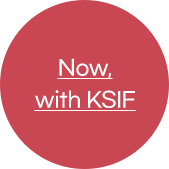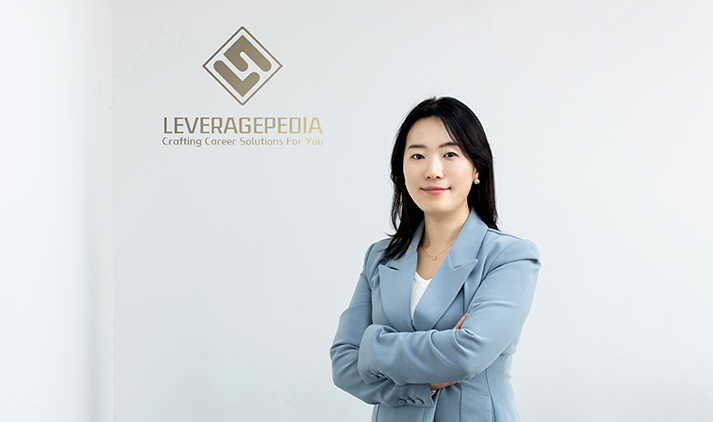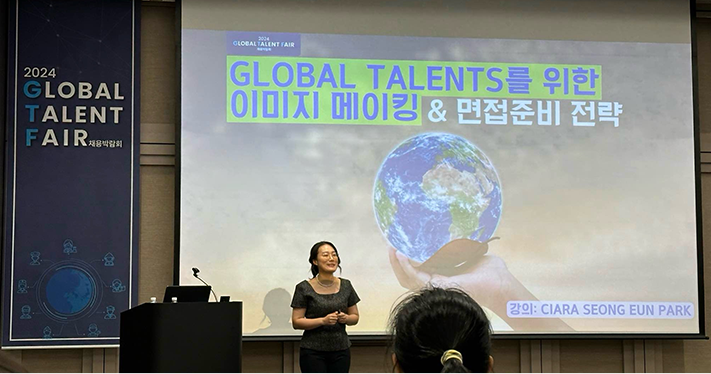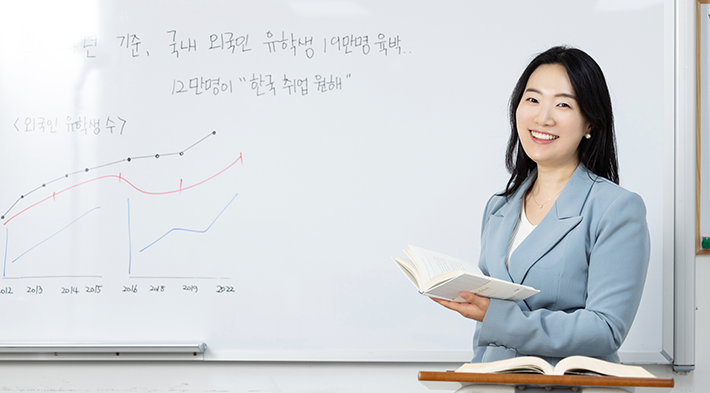

KSI Learners’ Employment Strategies
and Potential in Korea
Meeting with Park Seong-eun,
CEO of LEVERAGEPEDIA
In October, Park Seong-eun, CEO of LEVERAGEPEDIA, delivered a lecture in Metaverse KSI on “Trends in Korean
Company Employment and Preparation Strategies for Foreign Job Seekers.” Since 2016, Park Seong-eun has been
active as a professional career consultant both domestically and internationally. We spoke with Park Seong-eun
to gain insights on employment trends in the Korean job market for foreigners, the strengths of KSI learners,
and the skills foreign learners need to develop to achieve their dreams in Korea.
Hello, Ms. Park. Thank you for agreeing to this interview. Could you please introduce yourself to the readers
of Monthly Knock Knock?
Hello! I’m Park Seong-eun, the CEO of LEVERAGEPEDIA and a career consultant who aims to be “truly helpful to
you.” The employment success of over 100,000 students worldwide is the greatest achievement of my career, and
I’m honored to introduce myself here.
I initially appeared on Yonhap News TV’s Korean Job Broadcasting Channel as a mentor for students who
successfully secured jobs overseas. This led to three years of consulting work on programs like “K-Move: The
World Revisited” and “Successful Employment X-File.” My collaboration with the Korea Trade-Investment Promotion
Agency (KOTRA) has now entered its ninth year. This year, I also delivered a lecture on employment strategies
for foreign students in Korea at the Global Talent Fair recruitment expo.
Like KSI learners who are building connections with Korea through the Korean language, I’ve continued my
consulting career through the “power of connections.” So far, I’ve served as a mock English interview evaluator
for international students at over 90 universities across Korea, including Seoul National University, Yonsei
University, Korea University, and Incheon Global Campus (IGC). Additionally, I’ve conducted job-related lectures
and seminars for organizations such as KOTRA, the Human Resources Development Service of Korea, and the Korea
Tourism Organization. Through these efforts, I’ve helped over 100,000 job seekers navigate their career paths. I
aspire to be known as the “Seong-eun Hub” for job seekers, dedicated to their employment success.
 Delivering a Lecture on Employment Strategies for Foreign Students at the 2024 Global Talent Fair
Delivering a Lecture on Employment Strategies for Foreign Students at the 2024 Global Talent Fair
You have been providing employment strategy lectures for foreign students at numerous universities since 2016.
What inspired or motivated you to start consulting foreign students seeking employment in Korea?
I majored in English Language and Literature in university, and during that time, I worked as a tour guide in
the Bukchon Hanok Village, creating wonderful memories with foreign tourists. For me, this kind of “small-scale
diplomacy” was deeply meaningful—learning about the values and differences of people from other countries
through language without needing to cross borders physically. Additionally, I participated in LINK, an
international exchange community, where I helped friends from the Arabic Language and Literature department
understand Korean language and culture. These experiences gave me a strong sense of fulfillment in facilitating
language and cultural exchange. They also instilled in me the belief that I could help foreign students who come
to Korea share their values and communicate through language.
I officially began my career in employment consulting while preparing for a job transition. During that time, I
was asked to provide career and language coaching on several occasions. Thanks to a student I met during a
university lecture who later secured a position at a domestic company and recommended me, I gave an employment
seminar for foreign students at Sungkyunkwan University. Based on the positive feedback and employment outcomes
of my students, I went on to help foreign students address their job-related concerns and map out their life
roadmaps at universities such as Jeonbuk National University, Chung-Ang University, and Hanyang University.
In October, you gave a lecture at Metaverse KSI Job Fair on “Trends in Korean Company Employment and
Preparation Strategies for Foreign Job Seekers.” Could you share the trends in foreign recruitment by major
Korean companies? Specifically, what factors do Korean companies emphasize when hiring foreign talent?
We have truly entered the era of “K-Career.” According to KLiK, the foreign talent recruitment service on the
Korean job information site JobKorea, over 80% of foreign students currently in Korea wish to work in Korea
after graduation. This trend clearly illustrates that the era of K-Career has arrived.
Korean recruitment culture is divided into “Open Recruitment” (typically in March and September) and “Constant
Recruitment.” Open recruitment focuses on hiring a large number of new employees without specifying roles or
departments in advance. After a training period, the specific job and department are assigned. On the other
hand, constant recruitment is when companies post job openings whenever they need new staff, allowing them to
fill positions as necessary throughout the year. This approach allows for quick responses to new projects or
anticipated vacancies. Additionally, due to the rapidly changing industrial landscape in Korea, there is a
growing trend of “Gig Work” or Non-Regular Recruitment.
For foreign job seekers, it is crucial to understand these hiring practices and improve communication skills
within Korean workplaces. Korean companies highly value a candidate’s cultural adaptability—whether the
applicant can integrate well into the company culture and work effectively with colleagues. Korean language
proficiency is also essential for overcoming language barriers. It is beneficial to achieve high scores on tests
such as the Sejong Korean Assessment (SKA), the Adaptive Sejong Korean Assessment (iSKA), or TOPIK (Test of
Proficiency in Korean) Level 5 or 6, which are often preferred qualifications by major companies like Samsung
and Hyundai. Regularly checking platforms like JobKorea KLiK or the K-Visa website for updates and information
is also recommended.
 Park Seong-eun Explains Trends in Korean Company Employment
Park Seong-eun Explains Trends in Korean Company Employment
What should foreign job seekers focus on when writing a self-introduction letter and preparing for interviews?
Could you share specific tips that would help foreign learners who want to work at Korean companies?
If you visit the “Successful Self-Introduction” sections on Korean job information sites such as JobKorea or
Linkareer, you can find self-introduction letters written by successful applicants, categorized by job type and
industry. Recently, many people use AI services like ChatGPT or Google Gemini to assist with writing. These
tools are helpful, but I recommend using NAVER's AI service, CLOVA X, which best understands Korean culture and
context. This can provide more relevant guidance for writing your self-introduction letter.
Both self-introductions and interviews are about selecting global talent who can contribute to the company, so
it is essential to highlight your job competencies and character. Regardless of nationality, companies want to
hire “people they want to work with” who are capable of contributing on a global and local level (glocal
talent). As mentioned earlier, Korean language proficiency is also necessary to work effectively in Korea. While
major Korean companies may require TOPIK Level 5 or 6, it’s important to note that large companies may not be
the best fit for everyone. If you have a TOPIK Level 3 or 4, which allows for basic workplace communication,
that can also be sufficient. Most importantly, continue studying Korean to build a career portfolio that
supports your dreams in your chosen company and future career changes. Becoming a multilingual talent proficient
in Korean will give you a competitive edge. Don’t forget that!
What were the most common concerns or difficulties foreign learners expressed about employment in Korea during
your lecture at Metaverse KSI? How can KSI learners overcome these challenges based on your perspective as a
career consultant?
During the Metaverse KSI session held in October, learners had several frequently asked questions following the
lecture. These questions focused primarily on practical aspects of job seeking in Korea, such as how to search
for job openings, how to write an effective resume, and how to navigate cultural differences during Korean job
interviews. Learners also struggled with understanding the preferred qualifications listed in job postings and
how to meet those requirements. These challenges were often compounded by language barriers, visa restrictions,
and cultural differences. To help overcome these difficulties, I recommend two strategies for successfully
targeting Korean companies.
First, if you search for “외국인 유학생 채용” (foreign student recruitment) on Google, you will find 21 job information
sites (based on Google Korea results). These sites provide information about companies offering open
recruitment, constant recruitment, and periodic recruitment specifically for foreign students. You can also
check details about company profiles, job competencies, and preferred qualifications. Additionally, the KLiK
service on JobKorea offers not only job postings for foreign talent but also resources to help you understand
Korean workplace culture. Using these recommended sites to research the required job competencies and preferred
qualifications will help you tailor your resume and self-introduction letter to match the ideal candidate
profile for each company. Many Korean companies, especially those in the Top 50 by industry rank, emphasize
organizational fit. Highlighting your job-related strengths and your warm personality can demonstrate your
suitability. Remember that interviewers are also parents or neighbors, so approach interviews as a conversation
rather than a formal test. This mindset will help you deliver responses that create positive outcomes. By
consistently preparing in these ways, you can overcome obstacles and become the candidate that Korean companies
are seeking.
(Left Photo) Lecture on “Resume and Self-Introduction Writing”
for Foreign Master’s and Doctoral Students at Sungkyunkwan University
(Right Photo) Park Seong-eun (right) Providing One-on-One Consulting for Foreign Students After the Lecture
Could you share examples of successful employment cases involving foreigners or feedback from companies that
have hired foreign talent?
Many foreigners have successfully secured employment in Korea across various industries. For example, a Japanese
student obtained a marketing position at a promising Korean unicorn company, while a Vietnamese student was
hired as a litigation assistant at a law firm. Additionally, a Nepalese student secured an internship with the
foreign exchange team at a domestic bank. Additionally, there have been cases where a Vietnamese worker who
started out in a fish farm later became the CEO of a Samsung partner company. Many foreign workers who learned
technical skills in Korea have gone on to establish their own companies that grew into major suppliers for large
corporations. The common thread among these success stories is that these individuals possessed not only
job-specific competencies but also a solid understanding of Korean culture and proficiency in the Korean
language.
What advice or support can KSIF offer to KSI learners seeking employment in Korea?
Most foreigners I’ve met through employment consulting developed an interest in Korean culture through K-dramas,
K-pop, and other cultural channels. This interest often became a strong motivation for learning Korean.
Therefore, continuous support for Korean language and cultural education is essential to help these learners
experience the real Korea.
In the long term, it would be beneficial to see more regional companies and universities offer “work experience
programs” or “industry-academia partnership programs” to foster foreign students as regional talent. I believe
that if KSIF continues to expand collaborations with various companies, it can connect foreign language learners
with organizations, contributing to mutual national development and enhancing global competitiveness.

Lastly, please share a word of encouragement for foreign learners who aspire to work at Korean companies and
achieve their dreams in Korea.
On KSIF’s official YouTube channel, the German YouTuber “Ilayyda” inspires many people as a creator who shares
Korean culture. She asks, “Who will be the next KSI learner to achieve their dreams in Korean?” Borrowing her
words, I extend my heartfelt support to the future learners who will continue to pursue their dreams. I hope
that through your Korean language studies and cultural experiences at KSI, your passion and knowledge will
empower you to build a “glocalization” career in Korea. I will be with you on this journey toward a creative and
remarkable future.